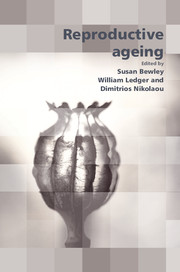Book contents
- Frontmatter
- Contents
- Participants
- Declarations of personal interest
- Preface
- SECTION 1 BACKGROUND TO AGEING AND DEMOGRAPHICS
- SECTION 2 BASIC SCIENCE OF REPRODUCTIVE AGEING
- SECTION 3 PREGNANCY: THE AGEING MOTHER AND MEDICAL NEEDS
- SECTION 4 THE OUTCOMES: CHILDREN AND MOTHERS
- SECTION 5 FUTURE FERTILITY INSURANCE: SCREENING, CRYOPRESERVATION OR EGG DONORS?
- SECTION 6 SEX BEYOND AND AFTER FERTILITY
- SECTION 7 REPRODUCTIVE AGEING AND THE RCOG: AN INTERNATIONAL COLLEGE
- SECTION 8 FERTILITY TREATMENT: SCIENCE AND REALITY – THE NHS AND THE MARKET
- 28 Evidence-based and cost-effective fertility investigation and treatment of older women: moving beyond NICE
- 29 Bang for the buck: what purchasers and commissioners think and do
- 30 Fertility treatment: science and reality – the NHS and the market
- SECTION 9 THE FUTURE: DREAMS AND WAKING UP
- SECTION 10 CONSENSUS VIEWS
- Index
30 - Fertility treatment: science and reality – the NHS and the market
from SECTION 8 - FERTILITY TREATMENT: SCIENCE AND REALITY – THE NHS AND THE MARKET
Published online by Cambridge University Press: 05 February 2014
- Frontmatter
- Contents
- Participants
- Declarations of personal interest
- Preface
- SECTION 1 BACKGROUND TO AGEING AND DEMOGRAPHICS
- SECTION 2 BASIC SCIENCE OF REPRODUCTIVE AGEING
- SECTION 3 PREGNANCY: THE AGEING MOTHER AND MEDICAL NEEDS
- SECTION 4 THE OUTCOMES: CHILDREN AND MOTHERS
- SECTION 5 FUTURE FERTILITY INSURANCE: SCREENING, CRYOPRESERVATION OR EGG DONORS?
- SECTION 6 SEX BEYOND AND AFTER FERTILITY
- SECTION 7 REPRODUCTIVE AGEING AND THE RCOG: AN INTERNATIONAL COLLEGE
- SECTION 8 FERTILITY TREATMENT: SCIENCE AND REALITY – THE NHS AND THE MARKET
- 28 Evidence-based and cost-effective fertility investigation and treatment of older women: moving beyond NICE
- 29 Bang for the buck: what purchasers and commissioners think and do
- 30 Fertility treatment: science and reality – the NHS and the market
- SECTION 9 THE FUTURE: DREAMS AND WAKING UP
- SECTION 10 CONSENSUS VIEWS
- Index
Summary
Diana Mansour: I am a bit frightened to put my name to this because I think in Newcastle we actually have fairly reasonable commissioners. But, having been involved in sexual health around England, I realise we do not have very good commissioning generally, and that is one of the biggest issues. Most commissioners are overworked and do not have a clue of what they are supposed to be commissioning. You are quite right: they probably do not know about the guidelines. But to go back to NICE, obviously that's England. What's happening in Scotland, Wales and Northern Ireland?
Berkeley Greenwood: Wales is probably the worst, because the minister said very recently that she has no intention of funding more than one cycle at the moment. David is probably in a better position to comment on Scotland than I am. Historically, it has been better than England.
David Barlow: There is the report of the Expert Advisory Group on Infertility in Scotland (EAGISS) that sits separately from the NICE guideline. NICE guidelines are advisory in England but they are even more advisory in Scotland [laughter], although it is something to pay attention to. The EAGISS guideline is a bit more liberal.
Siladitya Bhattycharya: The EAGISS report which predated the NICE guideline by a couple of years. It is made somewhat easier by the fact that there are fewer units in Scotland, so they are working together, in dialogue and engagement with the politicians, to see what can be done.
Keywords
- Type
- Chapter
- Information
- Reproductive Ageing , pp. 313 - 318Publisher: Cambridge University PressPrint publication year: 2009



